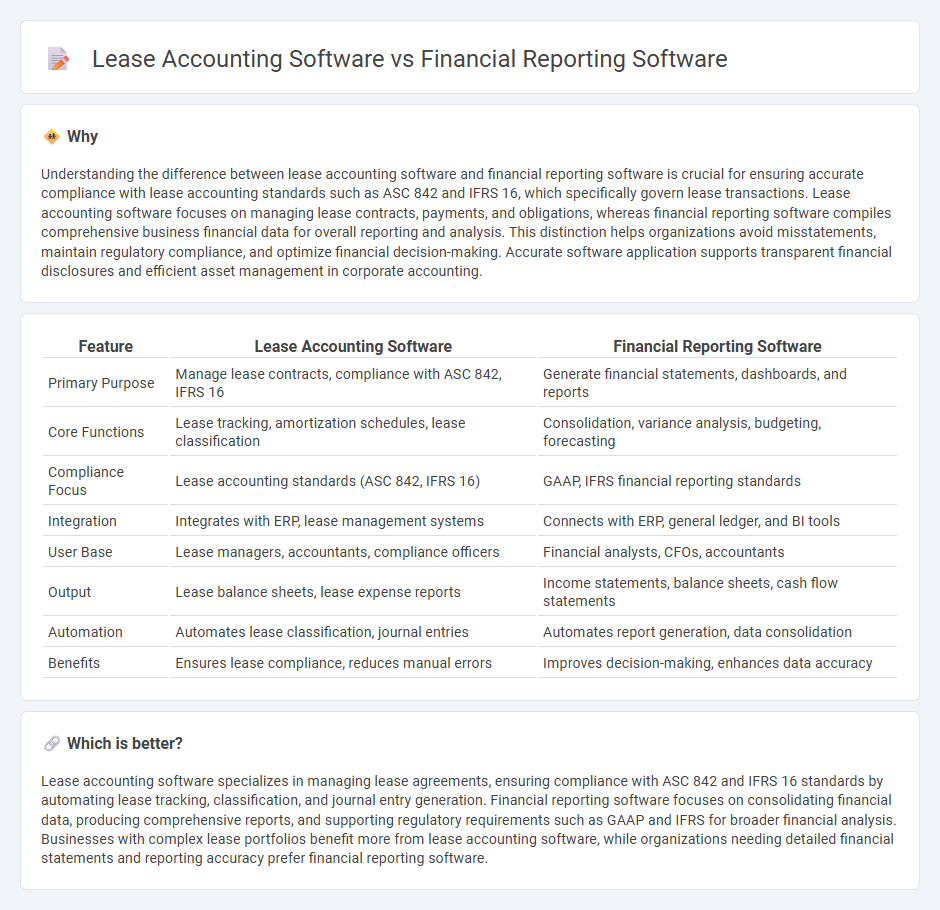
Lease accounting software specializes in managing lease contracts, ensuring compliance with standards like ASC 842 and IFRS 16, while automating lease classification, payment schedules, and asset tracking. Financial reporting software focuses on aggregating financial data to generate accurate reports compliant with GAAP or IFRS, supporting budgeting, forecasting, and audit readiness. Explore the unique features and benefits of each to select the best solution for your organization's financial management needs.
Why it is important
Understanding the difference between lease accounting software and financial reporting software is crucial for ensuring accurate compliance with lease accounting standards such as ASC 842 and IFRS 16, which specifically govern lease transactions. Lease accounting software focuses on managing lease contracts, payments, and obligations, whereas financial reporting software compiles comprehensive business financial data for overall reporting and analysis. This distinction helps organizations avoid misstatements, maintain regulatory compliance, and optimize financial decision-making. Accurate software application supports transparent financial disclosures and efficient asset management in corporate accounting.
Comparison Table
| Feature | Lease Accounting Software | Financial Reporting Software |
|---|---|---|
| Primary Purpose | Manage lease contracts, compliance with ASC 842, IFRS 16 | Generate financial statements, dashboards, and reports |
| Core Functions | Lease tracking, amortization schedules, lease classification | Consolidation, variance analysis, budgeting, forecasting |
| Compliance Focus | Lease accounting standards (ASC 842, IFRS 16) | GAAP, IFRS financial reporting standards |
| Integration | Integrates with ERP, lease management systems | Connects with ERP, general ledger, and BI tools |
| User Base | Lease managers, accountants, compliance officers | Financial analysts, CFOs, accountants |
| Output | Lease balance sheets, lease expense reports | Income statements, balance sheets, cash flow statements |
| Automation | Automates lease classification, journal entries | Automates report generation, data consolidation |
| Benefits | Ensures lease compliance, reduces manual errors | Improves decision-making, enhances data accuracy |
Which is better?
Lease accounting software specializes in managing lease agreements, ensuring compliance with ASC 842 and IFRS 16 standards by automating lease tracking, classification, and journal entry generation. Financial reporting software focuses on consolidating financial data, producing comprehensive reports, and supporting regulatory requirements such as GAAP and IFRS for broader financial analysis. Businesses with complex lease portfolios benefit more from lease accounting software, while organizations needing detailed financial statements and reporting accuracy prefer financial reporting software.
Connection
Lease accounting software integrates with financial reporting software by automating lease data capture and ensuring compliance with accounting standards such as IFRS 16 and ASC 842. This connection enables accurate recognition of lease liabilities and right-of-use assets, facilitating streamlined generation of financial statements and audit-ready reports. Enhanced data synchronization reduces manual errors and improves transparency in lease-related financial disclosures.
Key Terms
**General Ledger**
Financial reporting software integrates comprehensive General Ledger (GL) functionalities to consolidate financial data, ensuring accurate recording, classification, and summarization of transactions across all accounts. Lease accounting software specifically enhances GL processes by automating lease-related entries, compliance with ASC 842 and IFRS 16 standards, and timely recognition of lease liabilities and right-of-use assets. Explore detailed comparisons to understand how each software type optimizes General Ledger management and regulatory compliance.
**Lease Liability**
Lease accounting software specializes in accurately calculating and tracking lease liabilities in compliance with ASC 842 and IFRS 16 standards, ensuring transparent financial statements. In contrast, financial reporting software provides broader capabilities but may lack the detailed lease liability management required for precise lease accounting. Discover how integrating dedicated lease accounting solutions can improve lease liability reporting accuracy and regulatory compliance.
**Financial Statements**
Financial reporting software offers comprehensive tools for generating detailed financial statements, including balance sheets, income statements, and cash flow reports essential for regulatory compliance and investor relations. Lease accounting software specializes in automating lease data management and producing lease-specific financial disclosures required under ASC 842, IFRS 16, and GASB 87 standards, ensuring accurate lease classification and expense recognition. Explore how integrating both types of software can enhance your financial statement accuracy and streamline lease compliance.
Source and External Links
Best Financial Reporting Software in 2025: Top 8 Solutions - Datarails - Financial reporting software ranges from simple accounting tools like QuickBooks to complex ERP systems like Oracle Netsuite, BI tools like PowerBI, FP&A software like Datarails, and tax software such as Avalara, catering to different business sizes and needs with automated reports, dashboards, and compliance features.
Financial Reporting Tools: The 10 BEST Solutions In 2025 - Leading financial reporting software includes CloudZero, QuickBooks, NetSuite, Centage (an FP&A tool with budgeting and forecasting), and Workday, which integrates finance, HR, and planning with capabilities for automated, compliant reporting and extensive third-party integrations.
20 Best Financial Reporting Software Reviewed For 2025 - The right financial reporting software automates financial statement preparation, tightens reporting cycles, improves clarity, supports compliance, and enables faster decision-making, with expert recommendations helping users find tools tailored to their finance teams and strategic needs.
 dowidth.com
dowidth.com